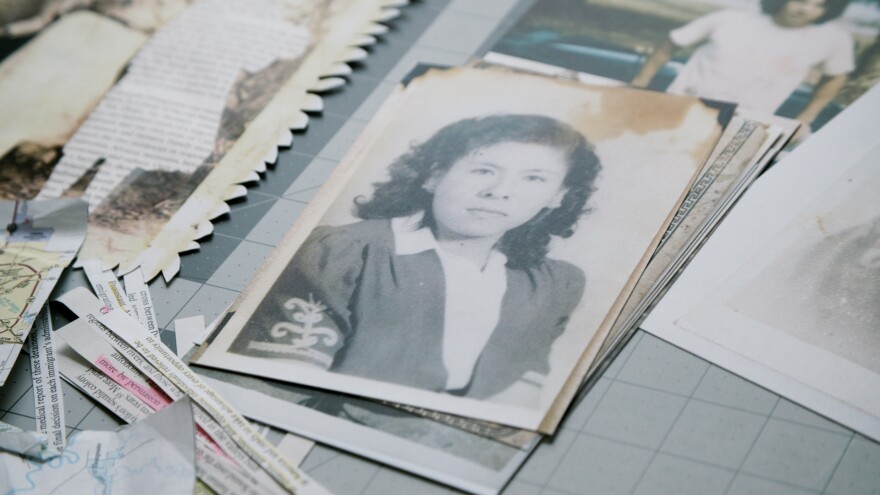In her Oak Cliff home studio, surrounded by found objects, cornhusks, various fabrics, and family photographs, artist Tina Medina is doing more than making art—she’s preserving cultural memory.
Through her interdisciplinary work that blends collage, painting, video, installation, and performance, Medina weaves together narratives of identity, displacement, and labor. “I explore whatever medium I can to get my idea across,” she said.
Medina’s pieces often center the voices and labor of Latino agricultural workers by repurposing archival photographs and texts into multi-layered collages. A reoccurring motif in her work is the presence of American and Mexican flags, often sewn together to express the interconnectedness of the two cultures.
“These people are the people that make up our country, that make the country what it is. And we should never forget those people.”
The dignity of faces
Many of the photographs Medina uses come directly from her own family archives—snapshots of relatives working in the fields, gathered at home, or caught in moments of everyday resilience.
“These aren’t just anonymous images—they’re pieces of my history,” she said. The act of reassembling them becomes both an act of reverence and reclamation.
“I want people to see the dignity in those faces,” she added. “That’s my grandmother, that’s my uncle—that’s where I come from.
A central aspect of Medina’s process is the act of collecting: “I’m always collecting – whether it’s stories or things or images or memories… they all get embedded into the work.”
As a professor at Dallas College, Medina also sees her role as an educator as part of her broader practice.
“I’m trying to show my students that someone like them can exist in the art world,” she said. “I also know that being in the classroom feeds my practice. I learn just as much from my students as they do from me.”
Honoring ancestors
Born and raised in Lubbock, Medina’s early years were marked by a sense of isolation.
“I felt like I was the only artist anywhere,” she recalled. “I didn’t even know that you could be an artist as a job.”
Now firmly rooted in Oak Cliff Medina has found the community she once lacked.
“Oak Cliff feels like home. It’s bilingual, it’s layered,” she said. “There’s a rhythm to it that feels like it’s holding me.”
In honoring those who came before her through her art Medina transforms material into memory.
“I’m here because my ancestors survived. I don’t know their names, but I carry their spirit,” she said. “Every stitch, every layer, is for them—and for the people coming after us.”
Tina Medina’s work will be featured in “Arte de Tejas: A Nascent Collection of Mexican American Artists” at Kirk Hopper Fine Art, July 26–August 23.



